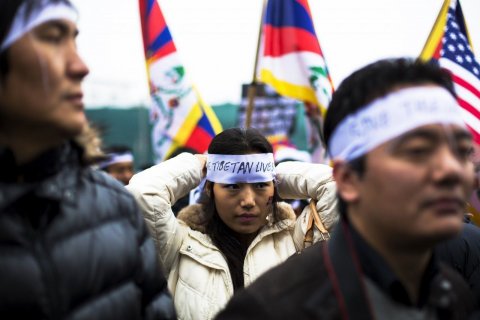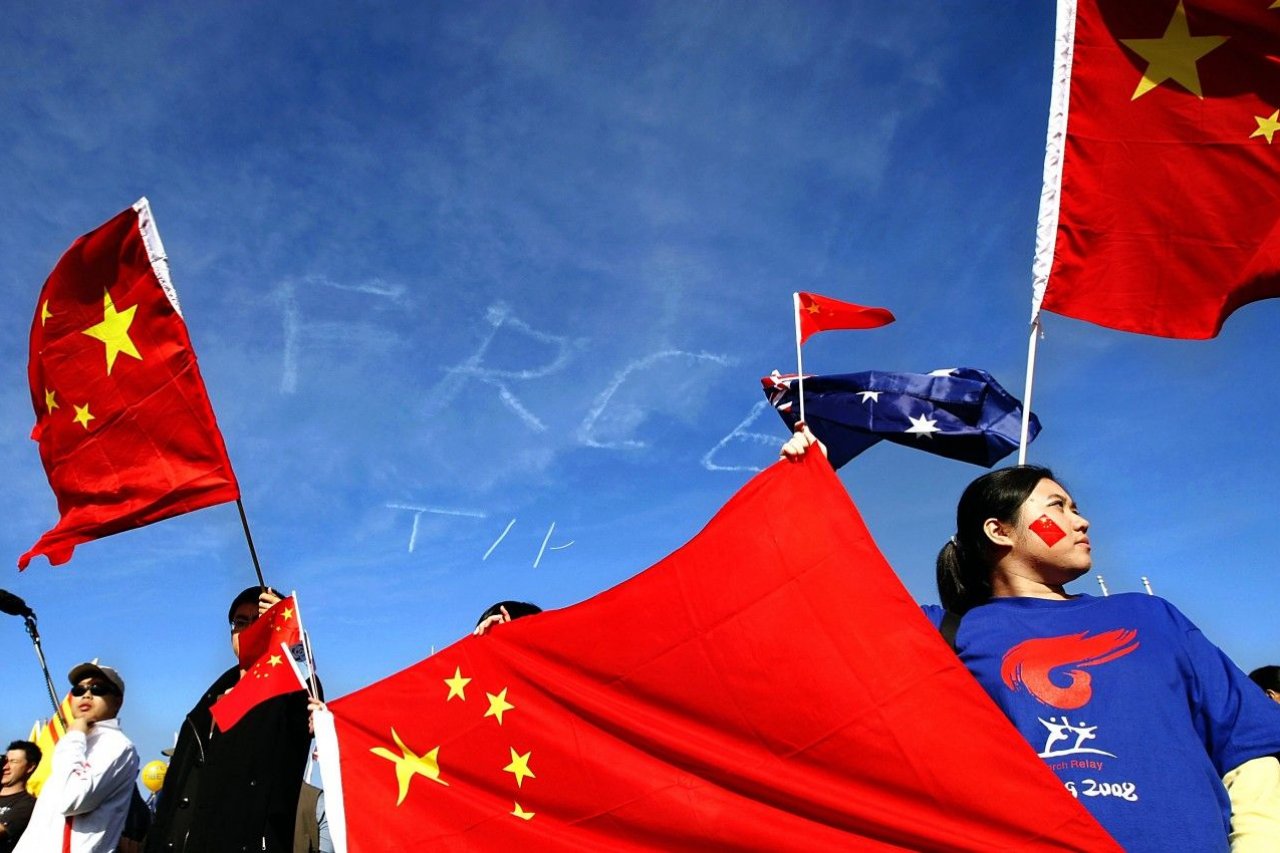All the phones started ringing at once, she remembers: Beep-beep, chimes, brrring! About 20 people in a room in San Francisco were getting calls, often, it turned out, from the person sitting right next to them. "Hello?" The room erupted. "Hello? Hello?" Strange voices then came from some of the phones, men with Chinese accents talking nonsense or ordering pizza. Then from out of the phones came the horrifying sound of screams.
"It sounded like people being tortured," recalls Lhadon Tethong, a leading activist for Tibetan independence. She eventually decided the screams were fake, recordings maybe from a horror movie. But for the older people in the room that day in 2008 in San Francisco, those with personal memories of China's brutal repression of Tibet, those screams were a harrowing reminder that no matter how far they moved away, the long arm of China could reach into their lives, even in America.
"They're very aggressive," I.C. Smith, a retired FBI China expert, says of Beijing's pursuit of the Tibetans and other dissident groups here. "They'll do any mischief that they can."
Vast, remote, Himalayan-high Tibet, with its saffron-robed Buddhist monks, 20-foot-long groaning trumpets and Dalai Lama, has long played an outsized role in U.S.-China relations. The fate of its 6 million people, scattered across an arid Central Asian steppe the size of Texas and Alaska combined, would hardly seem to merit much attention. Yet, as was demonstrated again recently, when President Obama inflamed Beijing by welcoming the Dalai Lama to the White House, Tibet, nominally an autonomous Chinese province, remains an important part of Washington's East Asia calculus. Push too hard in the South China Sea, Obama seemed to be saying, and we can set your backyard on fire.
The U.S. has done it before. For 20 years after the Communists took power in 1949, the CIA helped Tibetans resist Beijing's subjugation of the Buddhist province, even going so far as to train and arm Tibetan exile rebels at secret bases in Colorado. As part of the U.S.-China rapprochement in 1972, President Richard Nixon pulled the plug on the armed resistance, but the State Department continued to support the Dalai Lama and his government, which fled into exile in 1959. China has yet to fully integrate Tibet into its system, and its exile diaspora, headquartered in India but scattered around the world, has continued to agitate for independence.
One of its most prominent faces belongs to Tethong, 37, the charismatic, Boston-based, Canadian daughter of a former foreign minister in the exile government. As the former executive director of Students for a Free Tibet, which claims 6,000 volunteers and 50,000 followers, Tethong spends most of her time these days on a new project, the Tibet Action Institute, proselytizing against China-based Internet attacks on the movement and warning exiles to be cautious about opening emails with suspicious-looking "phishing" links. Once the hackers get inside - as even the most casual computer user knows by now - China has access to the owner's contacts file, with its telephone numbers and email addresses.

In the 2008 incident, when Tibetans gathered in San Francisco to demonstrate against Olympic torch-bearers en route to the Beijing games, Tethong tells Newsweek, "Basically our phones were made unusable for about three days, right when we needed them the most." She and others "knew" the assaults were coming from China, but only after partnering with the University of Toronto's Citizen Lab, which tracks hack attacks, has she been able to trace such electronic mouse-droppings definitively back to China.
"What we're working on trying to get people to recognize is that the mobile smartphone in their pocket is the perfect surveillance tool," she says. "You take it everywhere you go.... " Hackers can not only harvest your contact files and track your movements, they can activate your microphone and camera.
"One high-profile Tibetan group, during their annual board meeting a year ago, had a laptop on the table that they were using for a presentation," Tethong says, "and someone noticed that the camera light was on. That's one of the things we've seen lately in the malware world - the ability to turn cameras off and on."
The attackers are increasingly sophisticated. "The threat level is always highest when there is a Chinese dignitary visiting, either coming to the U.S. or Europe or wherever, and that's when there's the highest online activity - surveillance and what appears to be the other side trying to figure out what people are doing," Tethong says. The same goes for gatherings to mark the March 10, 1959 uprising in Tibet or the Dalai Lama's July 6 birthday. "There's a lot of activity in the activist community around those things and so they know that people may be more open to opening emails and messages. So they'll get a message that says something like, 'Here's the schedule for the Dalai Lama's birthday celebration in Chicago,' and open it up and it's got malware in it."
With such tools, physical intimidation would seem unnecessary, but Chinese agents frequently show up at exile events to take pictures of activists. Others pose as journalists to elicit details about the demonstrators or engage them in "endless arguments," Tethong says. Female agents are dispatched to seduce male activists.
Gabriel Feinstein, 24, was drawn to the Tibet cause after getting interested in Buddhism as a boarding school student in Utah. He's now a board member of the Tibetan National Congress, one of about 200 exile support groups around the world. "Every year since 2009, when I would organize protests in front of the Chinese consulate in Chicago," says Feinstein. "Chinese consulate officials would take surveillance photos and video of the Tibetan-American protesters. It was a common occurrence in Chicago to have vehicles drive by the marchers in cars that had diplomatic license plates [and] quick digital photographs were taken by the driver, who was clearly of Chinese-Asian descent."
Every time there's a sizable gathering of exiles, he says, Chinese-looking men show up to take their pictures. At a protest in New York in 2012, Feinstein noticed a man who appeared to be homeless using "an expensive Canon camera" to take pictures of demonstrators, who "followed me and my colleagues from Times Square all the way to Chelsea." A source later told him the man was being paid by the Chinese diplomatic mission in New York.
Likewise, while visiting a friend Toronto in 2012, Feinstein says he was "followed by two Chinese nationals throughout the city, [from] my hotel room all the way to the airport." Several times, he recalls, "I put distance between the individual and myself, even double-backing to pass the person in question - and was still followed." He says this caused his friend, "great psychological trauma."
Asked for comment, China's embassy in Washington, D.C., said it was "unaware" of reports of harassment.
Feinstein and Tethong have the luxury of treating the alleged surveillance as a security nuisance, however unnerving. Not so exiles with families back in Tibet. The few who are allowed back for family visits often discover that Chinese authorities have thick dossiers on their activities in the United States. "They are confronted, and their families are intimidated by authorities into getting them to stop their political activities overseas," Tethong says.
FBI counterintelligence has a full-time job battling China's massive theft of U.S. military and technological secrets, and doesn't have a lot of manpower to throw at protecting Tibet's dissident exiles from Beijing's agents. "They can operate with impunity," former FBI China expert I.C. Smith tells Newsweek, "because no one has the resources to devote to preventing something that is not a great offense."
The FBI declined to comment.
Exile leaders expect an upsurge in surveillance in the coming days, as they prepared for events marking the 55th anniversary of the uprising against Chinese rule on March 10. "There are marches, vigils - it's a big rallying day for the Tibetan exile community," Tethong says.
And a big day for China, since its watchers will be there, too.
Jeff Stein is a Newsweek contributing editor in Washington, D.C.





















